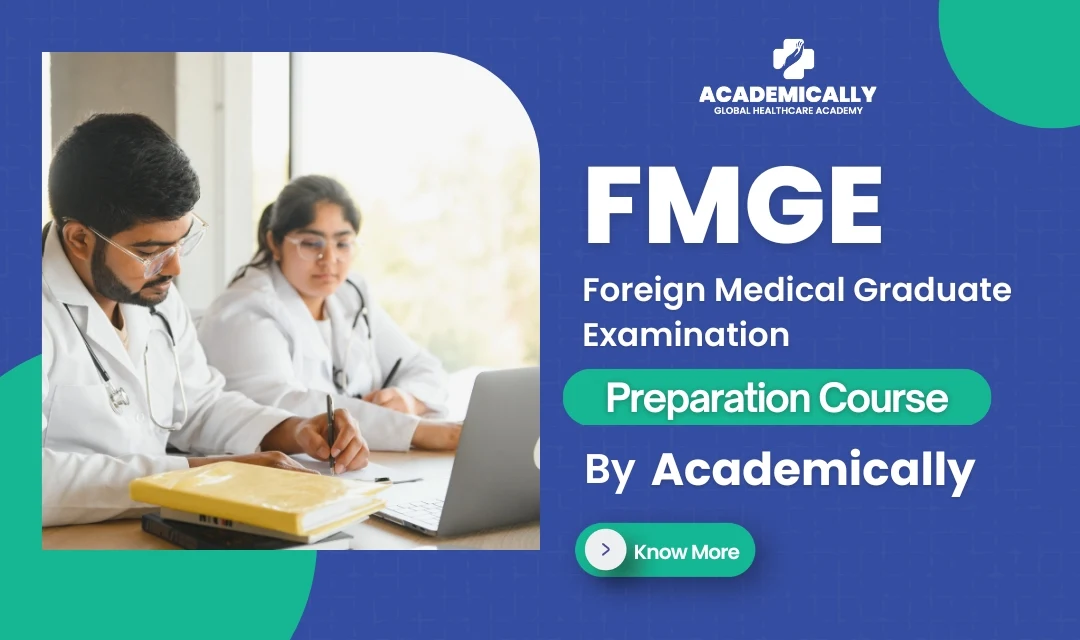Dreaming of practicing medicine in India after completing your MBBS abroad? Then you must clear the Foreign Medical Graduate Examination (FMGE). This exam decides if your foreign medical degree is recognized in India.
FMGE is known for its low pass rates and tough syllabus. But knowing year-wise pass percentages, trends, and success strategies can help you plan better and increase your chances of passing.
FMGE Pass Percentage: Year-Wise Statistics
Here’s a detailed look at FMGE pass percentages from recent years:
| Year/Session | Pass Percentage |
| 2025 (June) | 18.61% |
| 2024 (Dec) | 29.62% |
| 2024 (June) | 20.89% |
| 2023 (Dec) | 20.57% |
| 2023 (June) | 10.20% |
| 2022 (Dec) | 39.60% |
| 2022 (June) | 10.61% |
| 2021 (Dec) | 23.91% |
| 2020 (Dec) | 9.94% |
| 2019 (June) | 20.70% |
| 2018 (Dec) | 10.20% |
| 2017 (June) | 7.41% |
FMGE Pass Rate Trends: Understanding the Fluctuations
Several factors influence FMGE pass rates and explain the yearly fluctuations:
1. Session Timing
December FMGE exams usually yield higher pass percentages than June. Candidates in December often have more preparation time, leading to better results.
2. Improved Study Resources
Access to online coaching, mock tests, and study materials has significantly improved over the years, helping aspirants prepare strategically.
3. Regulatory Factors
Discussions around NExT (National Exit Test) have motivated aspirants to prepare more rigorously, impacting pass rates positively.
4. Quality of Foreign Medical Education
The country and university where the MBBS was obtained directly impact FMGE performance. Institutes with better clinical training tend to produce candidates with higher success rates.
5. Psychological Preparation
FMGE is high-stakes. Aspirants who maintain mental resilience, disciplined study routines, and stress management strategies tend to perform better.

Challenges in FMGE
Many aspirants fail due to:
- High exam difficulty.
- Limited clinical exposure in some foreign colleges.
- Lack of proper study materials or coaching.
- Psychological pressure, as it determines the ability to practice in India.
FMGE Exam Overview
| Feature | Details |
| Exam Conducting Body | National Board of Examinations (NBE) |
| Exam Mode | Computer-Based Test (CBT) |
| Total Questions | 300 Multiple-Choice Questions |
| Question Type | Single-correct MCQs |
| Marking Scheme | +1 for each correct answer |
| Negative Marking | No negative marking |
| Total Marks | 300 |
| Passing Marks | 150 (50% required to pass) |
| Exam Duration | 3 hours 30 minutes |
| Exam Sessions | Conducted twice a year - June & December |
| Subjects Covered | Preclinical, Paraclinical & Clinical |
| Attempts Allowed | Unlimited (until the candidate passes) |
| Eligibility | Indian/OCI students with MBBS degree from a foreign university |
Tips to Clear FMGE
Successful candidates follow these strategies:
- Make a structured study plan covering all subjects.
- Solve mock tests and previous papers regularly.
- Join peer study groups for doubt clearing and motivation.
- Focus on clinical knowledge and real-life scenarios.
- Maintain mental resilience, proper sleep, and a healthy routine.
Also, you can enrol in Academically's FMGE Preparation Course to pass the exam on the first attempt. By enrolling in this course you will get access to live and recorded lectures, practice questions, study materials, AI-based mock tests, personalised guidance, and much more.
Top Performing Countries
- Students from Russia, Ukraine, the Philippines, and China generally have higher pass rates.
- Choosing universities with better clinical exposure and exam alignment can improve FMGE performance.
Future of FMGE Pass Rates
- The introduction of NExT may bring changes to the FMGE structure.
- Better awareness and study resources are likely to improve pass rates.
- Aspirants may choose foreign universities based on FMGE success data.
Final Thoughts
The FMGE remains a critical gateway for foreign-trained doctors aspiring to practice in India. While historically challenging, the pass percentages show gradual improvement, particularly in recent December sessions.
By analyzing year-wise FMGE pass statistics, understanding the factors behind fluctuations, and implementing proven success strategies, aspirants can significantly improve their chances of clearing the FMGE. Preparation is a combination of discipline, strategic planning, and mental resilience and that’s what is important for FMGE success.
If you need any guidance or expert advice, you can reach out to Academically. Here you will get personalised career guidance and much more.